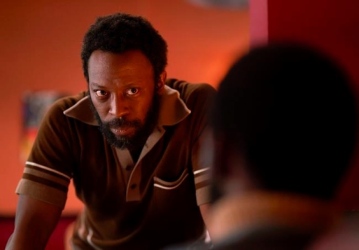The arrival of Steve McQueen‘s five films combined into the miniseries Small Axe is timely with a rise in protests against racism last year. Each film focuses on systemic racism prevalent in the 1970s and 80s in Britain, but perhaps Mangrove most resembles the current situation.
 Before its gentrification in the late 20th-century, Notting Hill, London was home to many Black citizens, and the Mangrove restaurant became an important meeting space for the Black community. Ever since its opening in 1968, the restaurant and its owner, Frank Crichlow (Shaun Parkes) were the subject of persistent raids by the police on the grounds of drug possession despite a lack of evidence. On the 9th of August 1970, the Black community staged a protest outside the local police station in response to these unjustified raids. Unfortunately, violence arose from the protests and led to the arrest of Crichlow and eight other Black people.
Before its gentrification in the late 20th-century, Notting Hill, London was home to many Black citizens, and the Mangrove restaurant became an important meeting space for the Black community. Ever since its opening in 1968, the restaurant and its owner, Frank Crichlow (Shaun Parkes) were the subject of persistent raids by the police on the grounds of drug possession despite a lack of evidence. On the 9th of August 1970, the Black community staged a protest outside the local police station in response to these unjustified raids. Unfortunately, violence arose from the protests and led to the arrest of Crichlow and eight other Black people.
Mangrove’s relevance to the unjustified arrests of Black people becomes apparent in its polices’ behaviour, particularly from Constable Frank Pulley (Sam Spruell). His detestation of Black people is evident with him frequently sneering at Frank Crichlow and other Black characters. However, when two of the defendants, Altheia Jones-LeCointe (Letitia Wright) and Darcus Howe (Malachi Kirby), question Pulley at court, it shows how baseless his accusations are against them. The cinematography emphasises Pulley’s stress and unease as the questions reveal flaws in his police report. McQueen uses shots that focus on Pulley’s hands and lips, which subtly display his discomfort. Wright and Kirby’s strong performances strengthen the courtroom scenes further with their dialogue and understanding of their justice in light of the law.
There is also further evidence of the disregard for the Black community in the production design of Mangrove. McQueen uses CGI subtly to recreate the construction of the Westway Flyover in the 1960s, which resulted in the demolition of many homes.
As with many films that centre on the Black community, McQueen’s Small Axe series might focus most on Black plight, but he elicits empathy from a universal audience. The poignancy in his work is so profound that it is difficult to ignore it. McQueen’s Mangrove and the Small Axe series as a whole demonstrates the director’s capacity to connect with different viewers and specifically empower Black audiences.


0 comments on “Persecution in Mangrove”